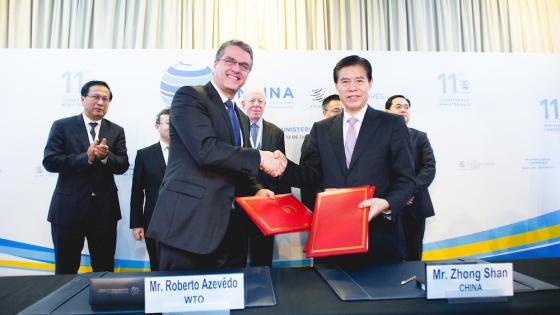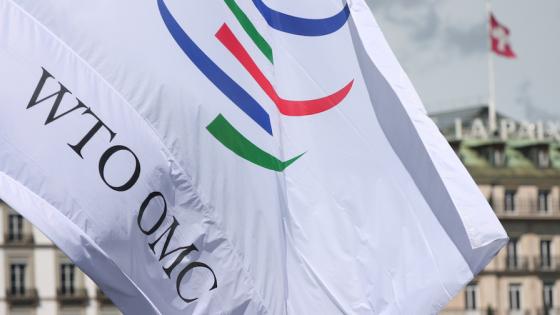Nearly six years after the launch of the Doha Round of multilateral trade negotiations there is a pervasive gloom about this initiative's prospects, at least in the near-term. Repeated deadlocks, many missed deadlines, and convergence at glacial speed appear to have convinced many that the probability of concluding the Doha Round later this year is slight. Even optimists, who have argued that plenty has been achieved in this trade negotiation and that a deal can be struck in 2007, must face the prospect that any such agreement is unlikely to meet the expectations created at the Round's launch. These perceptions matter when trying to convince prime ministers and presidents to spend time and political capital on World Trade Organization (WTO)-related matters, including the task of taking on the vested interests that stand in the way of concluding the Doha Round in the first place. The Doha Round is, there-fore, in a rut. The impasse has quite possibly become self-fulfilling.
In the recently released CEPR Policy Insight 11, I examine why the process of reciprocal trade negotiation, which many credit with being so successful in prior multilateral trade rounds, has run into so much trouble during the Doha Round. I argue that four factors have combined to frustrate the conclusion of reciprocal trade negotiations The addition of agriculture to the government policies in the multilateral negotiating set represented an expansion in the potential bargains that might form the basis of a deal in this Round. The greater degree of freedom created, however, could not be exploited because the negotiating objectives of "agriculture first" and less-than-full-reciprocity for developing countries could not be reconciled with disparate political economy considerations in leading WTO members, the degree of unilateral tariff reform, and with the boom in world trade and in certain emerging markets in particular. The EU and US pursued agricultural trade negotiating strategies that were not politically viable in their trading partners and their demands for tariff cuts on industrial products (driven up by the extent of unilateral reform in developing countries) could not be reconciled with some of the development-related principles adopted for this Round. Moreover, what was on the negotiating table was small compared to other developments in the world economy, making the cost of saying "no" easier, potentially reducing the effort spent on concluding the Doha Round in the first place.
Just because reciprocal bargaining in the Doha Round has been unable to deliver an agreement so far does not mean that reciprocity has ceased to be a fruitful tool in multilateral trade negotiations. Some of the factors mentioned above are contingent; some reflect the choices of WTO members. For one, the current fast growth of both international trade and the large emerging markets is not guaranteed. For another, WTO members can choose both the negotiating set and the principles upon which multilateral trade negotiations are based. Political economy factors may well change. For example, in 2008 or 2009 the EU member states are supposed to review the Common Agricultural Policy and this may allow for greater trade-offs on agricultural reform (bearing in mind that any such reforms would take effect after 2013 when the current 10 year package of policies towards EU agriculture expires.) Therefore the WTO membership, and by implication, progress in the Doha Round are not necessarily prisoners of forces at work in 2007. Having said that, the likelihood that any of the four factors that I have described changing much before the end of the year is slight, hence my pessimism about the near-term prospects for concluding the Doha Round and, therefore, my expectation that there will be a lull in negotiations for 18-24 months before, during, and after the US presidential election. The questions for policymakers, then, are how to use that lull productively and whether in the future it is desirable to restart multilateral trade negotiations after the next US presidential Administration is installed and on what terms.
In this Policy Insight paper I argue that policymakers would be better served if part of the coming lull were spent identifying promising alternative multilateral trade initiatives with which to compare picking up the Doha Round negotiations where they left off. At least this way decision-making can be informed by a comparison of alternatives, and the matter is not reduced to whether to abandon the Doha Round or not. Policymakers may then decide to supersede the current Doha Round proposals and, if so, whether or not the Doha Round is formally concluded could largely be a presentational matter.
To guide the identification and assessment of promising alternative multilateral trade initiatives to the current Doha Round proposals, I have pointed to three attributes that any such initiative should have. These attributes are Substantial Relevance (to the WTO's objectives, members, and constituent interests), Political Viability, and Feasible Implementation. A WTO-organised process could be established whereby a selected number of alternatives could be proposed and analysed for consistency with these three attributes. This process would have to draw on a wide range of expertise and need not be confined to WTO members, even though the latter are the ultimate audience and decision-makers. The WTO Director-General could play a useful role aggregating and summarising the different viable alternatives, eventually presenting a report to the WTO General Council in the middle of 2009.
The Doha Round impasse has taught us that reciprocity-based trade negotiations need not succeed and this ought to make us think more systematically about the numerous national political, diplomatic, economic, and other factors that are conducive to successful reciprocal trade negotiations. No doubt unforeseen circumstances and the capacity to take advantage of them will continue to play a part in multilateral trade negotiations, but this should not detract from the need for greater systemic and forward-looking thinking by key players before multilateral trade initiatives are embarked upon. The three attributes of promising multilateral trade agreements were discussed in detail in this Policy Insight--namely, Substantial Relevance, Political Viability, and Feasible Implementation--and ought to inform such thinking in the near-term and after. The upcoming lull in the WTO negotiations provides a first-rate opportunity to contemplate serious alternatives to the current set of Doha Round offers and is certainly preferable to policymakers sitting on their hands for a few years hoping that the current impasse will somehow resolve itself.


